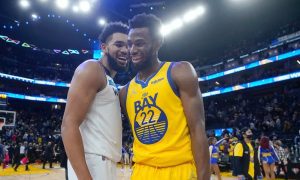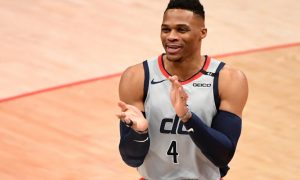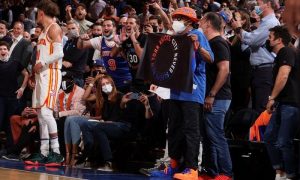Roughly two years ago an NBA franchise that had technically twice moved was nearly strangled by an ownership crisis and the trade demands of its best player; two years later that same franchise has been resuscitated and claims the title of the most intriguing team to watch for the 2013-14 NBA season.
That franchise is the New Orleans Pelicans.
The history of the Charlotte/New Orleans Hornets resembles much of the modern NBA landscape: founded amidst local basketball hysteria, a series of ownership blunders caused the team to pull up stakes and seek refuge in another city whilst refusing to abandon a nickname that is hilariously out of place in its new digs (paging Utah Jazz, Memphis Grizzlies and Los Angeles Lakers). The normal NBA franchise narrative then takes an abrupt departure: After the Hornets attempt to establish themselves in the Big Easy, Hurricane Katrina literally wrecks their arena and the vultures of Oklahoma City circled, but were unable to seduce George Shinn into permanently relocating in Oklahoma’s capital (incidentally, isn’t Vultures a much more appropriate nickname for Clay Bennett’s team). The Hornets return to New Orleans, Shinn affirms his commitment to the Crescent City and the state of Louisiana, then sells the team to the NBA. A miserable Chris Paul strong-arms a soon-to-be voided trade to the Lakers, but a week later is successfully dealt to the Los Angeles Clippers. Clearly the Hornets moniker is a harbinger of certain doom for this franchise.
Enter Tom Benson, and the reinvention of the New Orleans NBA franchise begins.
Benson’s credentials, however, are not the most favorable; after ham-handed attempts to extort the city of New Orleans and state of Louisiana into providing additional monies to keep the Saints in New Orleans, the former car dealer-turned-banker became persona non grata. A Super Bowl win in 2009 changed Benson’s relationship with New Orleans, allowing him the personal capital to purchase the Hornets from the NBA and bringing us to the present day and why the Pelicans are most interesting.
The Pelicans are able to start next season as an expansion team sans hopelessness. Prior to the 2013 NBA Draft and Dell Demps’s wheeling and dealing (which will be covered later) the then-Hornets announced a name change. After failing to get the Jazz to relinquish their nickname, other possibilities included the Brass (creative, but there are problems with the singular/plural form e.g. Heat, Lightning, Wild, Thunder) and Krewe (there is nothing more perplexing than intentionally spelling something incorrectly), but eventually the Pelicans emerged as the proper nickname. After Colin Cowherd and assorted other conventional thinking drones derided the nickname, a spirited defense was provided. Furthering that defense is the amazing lack of creativity in team nicknames throughout sports since the Florida Marlins and Colorado Rockies last picked local themed names. Baseball has been saddled with the Diamondbacks and Devil Rays. The NFL boasts the Panthers and Jaguars – neither wild cat is indigenous to the Carolinas or Jacksonville. The NFL became super-creative with the Houston Texans, possibly because the Houston Americans just seemed a little too generic. The NBA has the Raptors in Toronto, where nary a raptor roamed and the Grizzlies worked in Vancouver, but they moved to Memphis and kept the name. The NHL struck nickname gold with the Florida Panthers (panthers are indigenous to the sunshine state) but flattered to deceive with the Atlanta Thrashers, Columbus Blue Jackets (although deserving of bonus points for arcane Civil War nostalgia!), Nashville Predators and Minnesota Wild. There is nothing quite like generic predatory animals, preferably wild felines, to both play the nickname game safe and be redundantly banal.
Enter the Pelicans. The state bird of Louisiana is the brown pelican, and the pelican is a far more ferocious and efficient predator. If unconvinced, check out YouTube for videos of pelican attacks. Furthermore, great nicknames have a local flavor such as the Toronto Maple Leafs, Green Bay Packers, New York Knicks, Philadelphia Phillies and New Orleans Saints to name a few. The pelican adorns the state flag and seal of Louisiana and the state nickname is “the Pelican State.” Clearly the pelican is as ubiquitous a symbol of the state as the fleur-de-lis is of New Orleans, and Louisiana’s heritage. If the Pelicans became excruciatingly brutal then basketball fans can follow in the footsteps of their football brethren by referring to the Pelicans as the Peli-cants. Everybody wins!
Most importantly, Benson and his ownership made the right call, the Hornets were never truly a New Orleans institution in the way that Mardi Gras, the Saints and general debauchery are. The Pelicans have a chance through rebranding to build a community identity that is as unique as the city and state itself. The Saints managed to form deep ties to the community even though they resembled nothing short of a parody of a professional football team for roughly 40 years. Benson’s goal is to have the Pelicans perch atop the city’s cultural consciousness quickly because unlike 40 years ago when there was no competition with the Saints, in the age of the internet it’s imperative to gain a presence because fans can choose any NBA team to follow regardless of regional restrictions. Benson and the Pelicans do not want the fate of the Miami Marlins: have fans come to games for the sole purpose of mocking ownership and watching the other team.
The only way to get fans behind the team is to win. Pulling off an extended rebuild where the Pelicans are not competitive for a few years is disastrous. The 2012-13 Hornets featured the first pick of the 2012 draft, Anthony Davis, 10th pick Austin Rivers, Eric Gordon and Greivis Vasquez. Davis’s minutes were kept low (averaged about 29 minutes) and he missed significant time due to injury. The same problem existed for Rivers. Gordon was plagued by knee problems, but avoided the dreaded microfracture surgery. Vasquez was a revelation for the Hornets, the consistent force on a team blighted by inconsistentcy, growing pains and injury. No surprise the final season of these Hornets was awful. Since the move back from Oklahoma City in 2008, the Hornets made the playoffs three times (2008, 2009, 2011), but each appearance was short and frighteningly unremarkable. The case for the Hornets being an afterthought in New Orleans was settled meekly, with the team failing to justify the belief of a city and region. The new mascot can generate excitement, but that will not sustain throughout the season if the first season under the new banner is unsuccessful, for confirmation the Pelicans’ front office need only remind themselves of the atrocious 2012 baseball season of the Miami Marlins.
The Pelicans first moves had to be decisive, the fans needed to see the team committing itself to being competitive. The Pelicans could choose two roads to being a contender: trade young assets for proven players as the Celtics did in 2008, or they could acquire young, talented players that at the very least would entertain fans nightly. The Pelicans delightfully followed the latter. The first step was trading Nerlens Noel for Jrue Holiday. The 76ers were willing to take a chance on the rehabbing Noel for their rebuilding process and Holiday was expendable for that reason. Holiday has improved each year, and this past season his assists per game nearly doubled. The acquisition of a talented, young point guard allows for Gordon’s recovery not to be rushed although if Gordon’s health is optimal, his fitness for playing the 2 with Holiday at the point could be one of the more interesting backcourt combinations in the Western Conference. The Pelicans stayed busy after the draft, completing a sign-and-trade for Tyreke Evans, and in so doing traded Vasquez to the Sacramento Kings and Robin Lopez to the Portland Trail Blazers. The move of Vasquez was brilliant: His value would never be higher and his contract is quite favorable, Evans spent four seasons in Sacramento, with each season being notable for the increasing dysfunction of the Kings organization and the diminishing production of Evans. The Pelicans also signed Greg Stiemsma; Stiemsma, at 27, is one of the older players on the roster.
Naturally, there are curmudgeons claiming that the Pelicans are panicking and throwing away their opportunity to win in the future; one of the most prominent voices comes is that of ESPN’s Bradford Doolittle. His opinion is the Pelicans would be better off with Davis surrounded by Lopez, Vasquez and Ryan Anderson – going so far as to call that level of talent “solid.” Doolittle misses that Vasquez filled a scoring vacuum and his 2012-13 season is most likely the outlier, not the pattern. He also fails to note that Evans was playing in a horrible work environment: the Kings were threatening to move and DeMarcus Cousins had been suspended at various times the last two years and ran off Paul Westphal. That Evans’ numbers declined is equally as surprising as the revelation of Kobe Bryant condescending to Dwight Howard during the Los Angeles Lakers’ free agency pitch recently. The Kings situation is the absolute wrong place for a player like Evans to grow. Doolittle worries that Rivers will be buried on the bench, but after a poor rookie season perhaps the best thing for the young point guard would be to learn behind the likes of Holiday and Gordon.
Doolittle also fails to note that Evans can play the 3, and that a starting lineup of Holiday, Gordon, Evans, Davis and Stiemsma could compete for the 7th or 8th seed; Stiemsma projects as a large unknown, but the Pelicans have four projected starters with games that complement each other, and each player has something to prove. Davis needs to prove that he is a franchise player worthy of the prodigious pre-draft hype, Evans must prove that the Kings were the problem, not him, Gordon wishes to prove that his knee problems are behind him and Holiday aches to be in the discussion of the best point guards in basketball.
The Pelicans have good ownership and their general manager made creative deals that look good for sustainability. The biggest question for the Pelicans is whether Monty Williams is the guy to lead this young team. Williams brought the Hornets to the playoffs in 2011, but it was largely due to the efforts of Chris Paul. The past two seasons have been atrocious. Williams has been an assistant under Nate McMillan in Portland, but that’s about the extent of his coaching resume. Benson and Demps need to decide quickly if Williams is the guy for this lineup, otherwise the best fit for the Pelicans is a coach with a proven record of player development. If these players develop as players their age tend to do, the lineup for the Pelicans could be set for years to come, yet events in the Western Conference have opened the door for the Pelicans to seize the opportunity to force their way into the playoffs and make noise now.
There is some tumult in the Western Conference; last year the Houston Rockets were the 8th seed, they’ve acquired Dwight Howard and surely will ascend the standings; the Lakers took the 7th seed in large part due to Howard’s play in the second half of the season. The Nuggets lost Andre Igoudala and fired George Karl; they’re clearly in a rebuilding mode. The Jazz lost Paul Millsap and Al Jefferson; while those two players were not massive difference makers they did keep Utah competitive. Portland’s season was not much better than New Orleans’, but the Blazers haven’t done much to improve. The sharp declines of the Lakers and the Nuggets open the door for the Pelicans. Ask yourself, are the Pelicans better than Phoenix, Minnesota, Sacramento, Portland and Utah? The unequivocal answer is yes. Next question is, are the Pelicans better than the Lakers, Nuggets, and Mavericks? If the answer is yes to two of the three teams, the Pelicans are the 8th seed and there is the logic, and validation, to the Pelicans’ infusion of talented young players.
The fun of the NBA offseason is watching different teams employ different plans to ensure their long-term success. Some plans are asinine while others are carefully thought out and well-executed. The Pelicans are gambling on a new name and new faces to create a new atmosphere in one of America’s most storied cities; the Pelicans plan is a good one and will have fans in the New Orleans Arena saying, “laissez les bon temps rouler!”



















